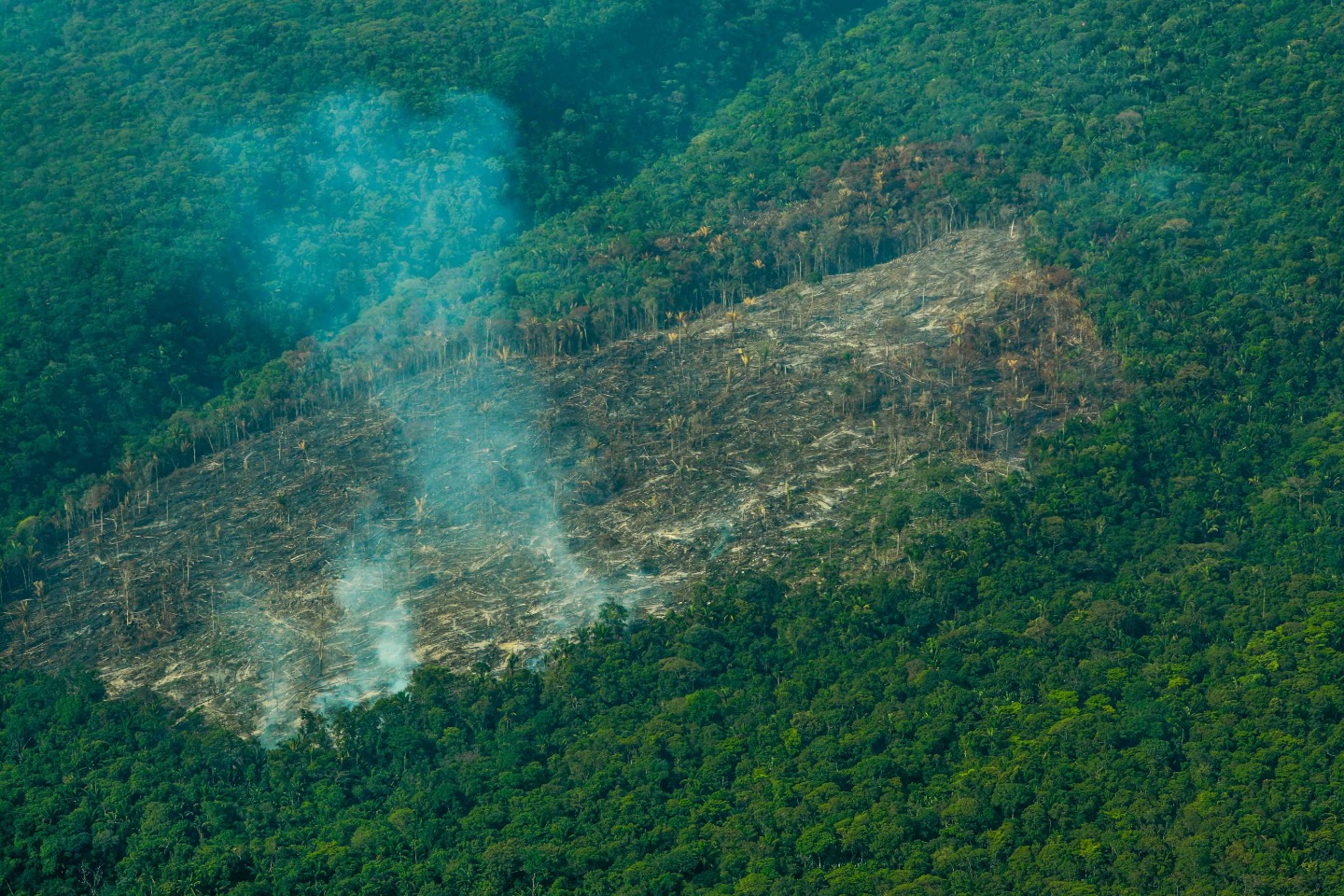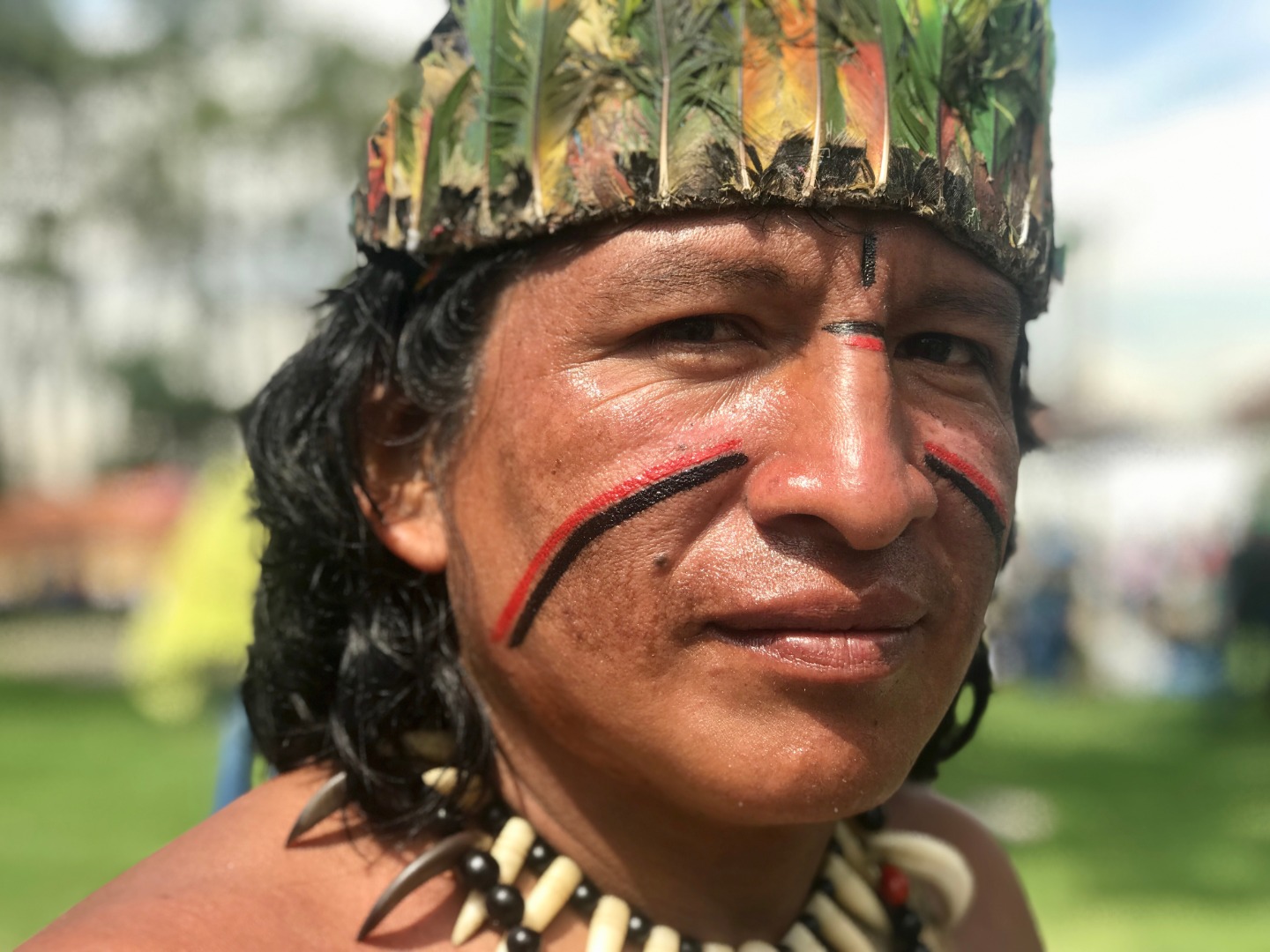It’s time to wake up. On Global Day of Climate Action, VICE Media Group is solely telling stories about our current climate crisis. Click here to meet young climate leaders from around the globe and learn how you can take action.
BOGOTÁ, Colombia — For all his life, Sterling Palacios has watched the dense jungle land he calls home act as a life force for the people of western Colombia.
Palacios, a wildlife preserver and local priest, lives along the winding, forest-cloaked Atrato River, a biodiversity hotspot inside one of the most biodiverse countries in the world. Wooden boats from local Afro-Colombian and indigenous communities pepper the river stretching from the Panama border down the Pacific coast.
Colombia’s armed conflict, which lasted more than 50 years, fueled bloodshed in remote zones like these, as leftist guerrillas, right wing paramilitaries and armed forces clashed.
The violence left more than 260,000 dead and millions more displaced, but it also had an unintended effect: it left much of rural Colombia untouched by humanity. This includes some of the most biodiverse ecosystems in the region, like the Amazon rainforest and Palacios’ home.
But after the signing of the 2016 peace agreement between the Marxist Revolutionary Armed Forces of Colombia (FARC) and the Colombian government, guerrillas laid down their arms and left those spaces unoccupied.
But the exit of the FARC - which acted as something of an arbiter in these areas - also left a power vacuum, and those natural resources exposed. Sterling has watched as swathes of the forest he works to protect get sliced or burned down by the patchwork of groups that have taken the rebels’ place.
Now, the pandemic is only exacerbating those vacuums, and with it, deforestation. And that could have long-term consequences.
“They're going to put an end to life in the territory,” Palacios said, explaining the fear he feels as he watches the resources indigenous people in the region live off of get destroyed. “Not just the life of nature, but the life of human beings.”
Colombia – second only to Brazil in biodiversity – is home to more than 50,000 registered species, according to government figures. That number is likely far higher because much of the territory has gone unexplored by scientists. Such an acceleration in deforestation may mean extinction for those species.
“It means, and it’s insane, that species can actually disappear before we discover them,” said Nicola Clerici, an ecology researcher at Colombia’s University of Rosario.

The now-demobilized FARC’s activities such as illegal gold mining used to finance their insurgency and had damaging effects on the jungle environment around them. But their control in those zones also restricted things like logging, hunting and contaminating rivers. After decades of war, many untouched areas of forest land once controlled by the rebel group opened up.
In their place, other armed actors and groups that could profit from exploiting the wealth of natural resources began to move in and take control of the valuable land.
“It’s not only because of the FARC leaving, but also the absence of the government,” Jose Vicente Rodriguez, senior scientific director of NGO Conservation International Colombia, told VICE News.
“There is no analysis or way of knowing exactly who [the perpetrators] are. There are a lot of actors: local ones, external ones, people taking advantage of expanding their opportunities… but the fact is it’s happening and it’s on the rise.”
This was the case in Palacios’ region of the department of Chocó, where paramilitaries, guerrillas of the National Liberation Army (ELN) and criminal gangs began to scramble for control after the FARC exited the scene. The numerous gangs, each with their own set of rules in the zones they control, make it hard for anything similar to the FARC’s own regulations to take hold.
This made way for surges in illegal logging and gold mining, where miners clear large swathes of trees and often contaminate the river that breathes life into the surrounding jungle with mercury. The armed groups profit from such exploitative practices, charging a vacuna, or protection money, for the use of the land.
This has had a ripple effect on local Afro-Colombian and indigenous communities that work to preserve the forests and live off the land. Palacios describes riding along the river and seeing miles of barren land where jungle used to be.
Between 2016 and 2019, Colombia lost more than 1.3 million hectares – roughly 2.5 million football fields – of tree cover, according to data from Global Forest Watch.
Since 2002, the South American country has lost more than 36% of its primary forest – dense forest in different parts of the world that have been in a region for centuries and therefore hosts a vast range of species.
Now, coronavirus has offered these actors another unique opportunity, explains Gimena Sánchez, Andes director of the Washington Office on Latin America (WOLA) think tank.
On the one hand, there are “less eyes” monitoring their actions, she said. While Colombia’s government has focused its resources on combating the pandemic or other military operations, international watchdogs have also diverted their attention.
“It's a combination of a lack of state presence, and a lack of international attention to all these issues,” she said. “Every country is dealing with its own version of the crisis, becoming more insular.”
On the other hand, with the global economic crisis triggered by the pandemic certain practices like gold mining have grown more lucrative as international investors seek out more stable markets and physical capital.
While the Institute of Hydrology, Meteorology and Environmental Studies (IDEAM), Colombia’s government entity tracking deforestation, has declined to comment or provide data to VICE News, other scientists have been tracking the uptick.
A key indicator of deforestation are forest fires – the fastest and most economic way to clear a piece of land of trees. Researchers have used satellite imagery to capture and track those fires.
In 2020, Colombia has had the highest number of deforestation fires since 2012, the first year data was available, according to a report by University of Bristol researchers.
While the sharp spike in deforestation seen immediately after the peace process slowed in recent years, the university report concluded that Colombia is on course to reverse gains made in 2018 and 2019 combined.
In the Amazon – one of the zones most acutely affected – such fires tripled during the first month of lockdown compared to 2019.
Rodriguez said that it’s in areas like the Amazon where deforestation is at its worst.
“The pandemic has increased state absence even more as they’ve had to focus their efforts on the health crisis. But this has caused a lack of presence in more rural areas,” Rodriguez said.
He added the pandemic has caused poor rural farmers to find ways to make money, and many turned to chopping down areas of forest for wood.
Logging by locals has been a major problem in Palacios’ Chocó for years, and the local leader thinks it’s on the uptick now, but nearly six months of quarantine has prevented him and other local communities from monitoring zones where it's happening.
That’s a struggle that has played out across the country – local conservationists are cut off from the ecosystems they work to preserve, either due to mobility restrictions or increased risk of coronavirus infection.
Indigenous communities have perhaps been most disproportionately affected by this. Early in the pandemic, Colombia’s Amazonian communities were ravaged by the virus.
From the indigenous Awa community deep inside the Amazon, David Taicus, 40, a spokesman for his people, says the government does nothing to help them and accused the administration of Jair Bolsonaro of letting multinational corporations and other exploitative interests take over their land.
He spoke to VICE News in a video interview, wearing red and black face paint and traditional dress made of animal’s teeth, bones and feathers.

He said that the deforestation had not just a ripple effect on the forest and ecosystems around them, but on the basic ways they live their lives. Species of animals they hunt and plants they use in traditional medicine are vanishing.
“When the armed groups were here, the forests were safer. Now all these other [groups] are moving in and it’s worse,” Taicus said.
Clerici, the ecology researcher, has been monitoring deforestation during the country’s shaky peace process. He said this uptick is likely to have serious implications for the future. On a human level, other scientific research draws a connection between deforestation and an increased spread of infectious diseases like the coronavirus.
Clerici was also quick to point out that the phenomenon will only empower armed groups, who see an increase in profits alongside an uptick in illicit activities.
But for the Awa people and many other communities witnessing the destruction of their lands, the future looks bleak.
“In Colombia the government is even more corrupt than the armed groups,” Taicus said.
“They’re going to wipe us out.”
from VICE US https://ift.tt/3mUcYik
via cheap web hosting

No comments:
Post a Comment